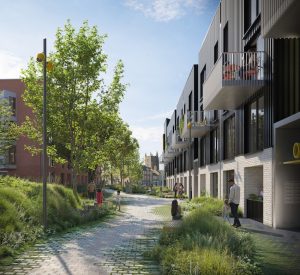Talking Business: Andy Elwell, Anglo Holt Construction

In the latest in a series of ‘Talking Business’ interviews, Andy Elwell of Anglo Holt Construction, chats to the editor of TheBusinessDesk.com Andy Coyne, and KPMG director Pete Saunders.
COMMENTFinding the answer to fundingWith recent GDP figures showing a disappointing and unexpectedly large fall in construction activity, a lot of the recent focus has been on how the sector bounces back. The picture is mixed, with certain elements of the sector and certain geographic locations prospering whilst others suffer. A consistent theme emerges when discussing development finance: a banking system managing significant historic exposures to the sector (including an estimated £150bn of commercial property debt falling due for repayment by 2016), the impact of regulation, uncertainty over the economic outlook and withdrawal of market participants all contributing to a tightening in credit conditions. Funding for anything other than moderately geared, prime property held by well capitalised businesses presents a challenge, with speculative development in particular suffering. Necessity is of course the mother of invention, and we are therefore increasingly seeing alternative strategies being adopted in order to plug this funding gap. On the one hand there are classes of investor with access to significant capital (funds, insurers, high net worth individuals and even some construction businesses) who are looking to put funds to work and make a return, and on the other hand there are developments starved of the cash required to take them forward.
Pete Saunders is a director at KPMG, specialising in the property and construction sector
|
AGAINST a backdrop of building firms going to the wall on a weekly basis, West Bromwich’s Anglo Holt Construction has bucked the trend. It has a healthy looking future order book and regular commissions from the likes of hotel group Travelodge. But managing director Andy Elwell readily admits that what looks like excellent strategic thinking – working with, relatively speaking, recession-resilient sectors such as hotel and leisure – came about largely by accident. “We were doing a lot of work with the automotive sector down in Longbridge,” he remembers. “The works engineer’s daughter worked for a local quantity surveying practice which worked with Travelodge. The recommendation came one night over dinner when our name cropped up. That started us off in the hotel sector. “That was about 14 years ago. It has been a bit of slow burn. We worked for two years before we built the first one. But it has escalated.” Escalated it most certainly has. At the end of June Anglo Holt announced it had won its largest ever project with Travelodge. The company’s successful partnership with Travelodge has seen it complete 54 hotels, with a further eight contracts currently in progress, worth a total of more than £200.5m. Elwell says: “Our ability to deliver hotels on time and on budget for Travelodge has been clearly demonstrated in the completion of 54 projects to date.” It is a point echoed by Tony O’Brien, UK development director for Travelodge Hotels, who says: “Anglo Holt have been instrumental in helping us grow at the pace we have. Sixty two hotels is an incredible achievement and the speed at which they work enables us to get our hotels open quickly and filled with our customers.” And yet hotels weren’t part of the plan when Anglo Holt started in the 1970s in Tipton. “One thing that was the same was that the whole concept of the business was always design and build,” Elwell says. “But back then it was more linked to local industry, working with local manufacturers around the Black Country.” Elwell joined Anglo Holt 22 years ago. He started at the firm as a carpenter and steadily progressed through the ranks. He admits that for Anglo Holt, moving from the shed structures required by the automotive industry and others to hotel schemes was something of a challenge. “It was completely new technology. It was starting again in terms of the building techniques,” he says. “We just developed the expertise. We were lucky to have that two year lead into it. We could do a lot of research before we got on site.” Once the first one was up, hotel building became a core part of the firm’s business. “At peak times we have been doing about ten a year. The bulk of the work has been done in the last five or six years,” Elwell says. And nor is the deal with Travelodge an exclusive one. It has built a Holiday Inn and is building for Hilton – the four-star DoubleTree by Hilton hotel opposite Edgbaston cricket ground in Birmingham. The 27,000 sq ft, 200 bedroom hotel is due to complete next year. And then there have been the car showrooms. “Car showrooms came along at the same time as hotels and was again a slow burn,” Elwell says. “It was off the back of working with the automotive industry. It died off about three years ago and has now started to pick up again.” So how does he explain the firm’s spot on positioning: working with the right sectors at different points in the recession? “I’d like to say it was a plan but it clearly wasn’t. What we have found is that automotive always picks up coming out of a recession. The likes of Jaguar Land Rover at the moment are absolutely flying. We’ve worked with JLR for 20 years.” But Elwell understands well that things can change very quickly. “If you look at the hotel sector’s expansion over the last few years it has to come to an end, perhaps in four to five years’ time. It can’t continue at the pace it has,” he says. “But at the moment all the foreign brands are looking at Birmingham.” The message from the Anglo Holt story seems to be that even in difficult sectors firms can succeed if they stick to what they do best – in Anglo Holt’s case a specialism in design and build has meant there have been no costly mistakes as a result of building speculatively.
It would be wrong to suggest the firm is immune to the problems the construction sector has faced. These problems include a lack of underlying projects because of commercial property funding and, to a lesser extent, PFI project funding, drying up, fluctuating material costs and cash flow problems because of slow payment throughout the construction food chain. Anglo Holt’s circa £52m turnover is close to pre-downturn figures. But as Elwell admits: “In terms of profitability it’s hard work.” He understands the cyclical nature of the construction game and is keen to position the firm – which employs 96 people at its base close to West Bromwich town centre – so that it doesn’t become reliant on one sector and is nimble-footed enough to take advantage of any new opportunities that arise. Whatever that challenge is, Elwell and Anglo Holt are likely to be able to face it with some confidence, having shown in the past an ability to change tack effectively. “Some people pigeon hole you. We were pigeon-holed as an industrial builder so breaking into the leisure market was a big step for us,” Elwell says. “We have to start looking at what replaces hotels. The automotive industry will do well in the short term and then you’re looking at the next thing, whether that’s retail or industrial.” “These things will come back. All it takes is for someone to put a toe in the water.” SectorsCommentsIf you'd like to leave a comment, please register now for free or login
|

 Innovating to bring the two together, in conjunction with potential public sector input and incentives, will be an important and on-going challenge for the sector and key to providing the investment in housing and infrastructure that the sector needs to create jobs and growth.
Innovating to bring the two together, in conjunction with potential public sector input and incentives, will be an important and on-going challenge for the sector and key to providing the investment in housing and infrastructure that the sector needs to create jobs and growth. 
 And while it may have been lucky to stumble across work in the hotel and leisure sector, luck doesn’t get you 62 hotel contracts. A reputation for delivering on time and excellent customer service has been the driver here.
And while it may have been lucky to stumble across work in the hotel and leisure sector, luck doesn’t get you 62 hotel contracts. A reputation for delivering on time and excellent customer service has been the driver here.







